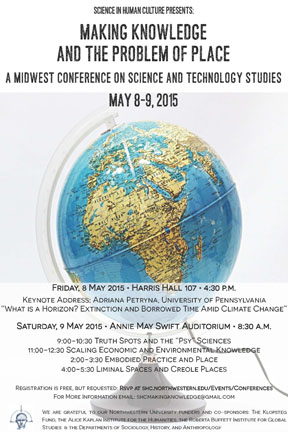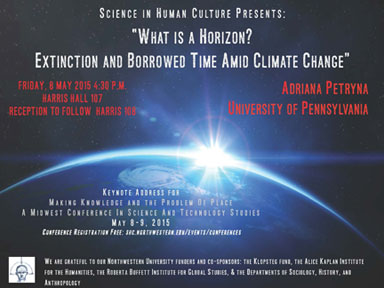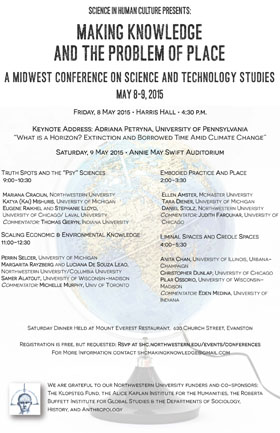Making Knowledge and the Problem of Place
MAKING KNOWLEDGE AND THE PROBLEM OF PLACE: a midwest conference on science and technology studies
Conference details
Northwestern University's Science in Human Culture Program and the Interdisciplinary Graduate Cluster in Science Studies are pleased to host the second Midwest regional Science and Technology Studies conference, with participation from faculty and students from colleges and universities across the Midwest. The conference, organized in collaboration with colleagues at different schools, is intended to strengthen the Midwest STS community and promote STS-related scholarship in the region. The first two-day event in 2012 drew more than 100 attendees and panelists from more than a dozen colleges and universities across the Midwest.
The year’s theme “Making Knowledge and the Problem of Place” is designed to explore science studies research in different parts of the world and across different times, scales, and institutional sites. We have managed to attract scholars who work on East and South Asia, North and West Africa, Central and Western Europe, and North and South America. Our subjects range from bodies as sites of knowledge production to global environmentalism and from nuclear research to cell phone technologies. The commentators confirmed for the panels are leading scholars in the fields of sociology of science (Thomas Gieryn), medical anthropology (Judith Farquhar), race and gender studies (Michelle Murphy), and cybernetic studies (Eden Medina). Adriana Petryna, a well-known anthropologist of science and our keynote speaker, is author of two influential monographs, Life Exposed: Biological Citizenship after Chernobyl (Princeton, 2002) and When Experiment Travels: Clinical Trials and the Global Search for Human Subjects (Princeton, 2009); she also co-edited Global Pharmaceuticals: Ethics, Markets, and Practices (Duke, 2006) and When People Come First: Critical Studies in Global Health (Princeton, 2013). The event ought to foreground the different ways place and space have mattered and continue to matter to the production of knowledge.
"Making Knowledge and the Problem of Place" is supported by the following Northwestern University funders and co-sponsors: The Klopsteg Fund, the Alice Kaplan Institute for the Humanities, the Roberta Buffett Institute for Global Studies, and the Departments of Sociology, History, and Anthropology.
Keynote speaker
Friday, May 8 | Harris Hall 107 | 4:30 PM
ADRIANA PETRYNA: Anthropology Department, University of Pennsylvania
"What is a Horizon? Extinction and Borrowed Time Amid Climate Change"
Abstract | Extinction is an ecological construct that assumes some loss of natural structural stability. It also signifies a curious hiatus in the scientific imagination of what might come next. This talk is part of a broader project that examines emerging scientific practices meant to monitor increasingly unpredictable ecosystemic behaviors and to inform prospective thinking about how natural systems and societal infrastructures might adapt to ecological dangers linked to global climate change. Given increasing potentials for catastrophic surprises, I discuss how scientists are quantifying points of no return for ecosystems under threat and developing toolkits to detect early warning signals in what I call horizoning work.
Bio | Adriana Petryna is the Edmund J. and Louise W. Kahn Term Professor in Anthropology at the University of Pennsylvania. Her books include Life Exposed: Biological Citizens after Chernobyl (Princeton U Press, 2013 [2002]) and When Experiments Travel: Clinical Trials and the Global Search for Human Subjects(Princeton U Press, 2009). She is coeditor of Global Pharmaceuticals: Ethics, Markets, Practices (Duke U Press, 2006) and When People Come First: Critical Studies in Global Health (Princeton U Press, 2013).
Program details
Friday, May 8 | Harris Hall 107, 1881 Sheridan Road
| directions to south campus parking garage, 1847 campus drive map.
| directions from south campus parking garage to harris hall map.
| parking is FREE after 4:00pm + weekends.
|
Time |
Detail |
|---|---|
|
4:30 pm |
Keynote address: Adriana Petryna, University of Pennsylvania (Anthropology, Professor) |
|
6:00 |
Public reception | Harris Hall 108 |
|
Saturday, May 9 | Helmerich Auditorium, Annie May Swift Hall, 1920 Campus Drive |
|
|
| directions to south campus parking garage, 1847 campus drive map. | directions from south campus parking garage to annie may swift hall map. | parking is FREE after 4:00 pm + weekends. |
|
|
8:30 am |
Continental breakfast |
|
9:00-10:30 |
Panel 1: Truth Spots and the “Psy” Sciences |
|
Mariana Craciun, Northwestern University (Sociology, Postdoctoral Fellow) “Beyond the Psychoanalyst’s Couch: Place and Time in Psychotherapy” |
|
|
Katya (Kai) Mishuris, University of Michigan (History, graduate student) “Mental Testing in Russian Child Science” |
|
|
Eugene Raikhel, University of Chicago (Human Development, Assistant Professor) and Stephanie Lloyd, Laval University (Anthropology, Assistant Professor) “Uncertain Objects in the Molecular Epigenetics of Suicide Risk” |
|
|
Commentator: Thomas Gieryn, Indiana University (Sociology, Professor) |
|
|
10:30-11:00 |
Coffee break |
|
11:00 am - 12:30 pm |
Panel 2: Scaling Economic and Environmental Knowledge |
|
Perrin Selcer, University of Michigan (History, Assistant Professor) “Placing the Global Environment” |
|
|
Margarita Rayzberg, Northwestern University (Sociology, graduate student) and Luciana de Souza Leao, Columbia University (Sociology, graduate student) “Where Field Experiments are Conducted in Economics: NGOs as a Site of Knowledge-Making in International Economic Development” |
|
|
Samer Alatout, University of Wisconsin-Madison (Environmental Sociology, Associate Professor) "From River to Border: the Jordan, Palestine, and Environmentalism of the Colonized” |
|
|
Commentator: Michelle Murphy, University of Toronto (History and Gender Studies, Professor) |
|
|
12:30-2:00 pm |
Lunch | Harris Hall 108 |
|
2:00-3:30 |
Panel 3: Embodied Practice and Place |
|
Ellen Amster, McMaster University (History and Clinical Epidemiology, Professor) “The Muslim Midwife: Birth as Medical Knowledge, Social Mediation, and the Constitution of the Political Subject in French Morocco" |
|
|
Tara Dosumu Diener, University of Michigan (History/Anthropology, graduate student) “The Importance of Knowing about Not Seeing in a Sierra Leonean Hospital” |
|
|
Daniel Stolz, Northwestern University (History, Postdoctoral Fellow) “‘Manual Apprenticeship’: Embodiments of Measurement in British Occupied Egypt” |
|
|
Commentator: Judith Farquhar, University of Chicago (Anthropology, Professor) |
|
|
3:30-4:00 |
Coffee break |
|
4:00-5:30 |
Panel 4: Liminal Spaces and Creole Places |
|
Anita Chan, University of Illinois (Media Studies, Assistant Professor) “Networking Peripheries: Technological Imaginaries, Innovation Futures and Hacking the Informatic Ideal in Latin America” |
|
|
Christopher Dunlap, University of Chicago (History, graduate student) “Scientific Communities, Nuclear Energy and Diplomacy in Brazil and Argentina, 1970-1995” |
|
|
Pilar Ossorio, University of Wisconsin-Madison (Law, Professor) “Bioscience Data Sharing: Data Repositories as Liminal Spaces” |
|
|
Commentator: Eden Medina, University of Indiana (Informatics and Computing, Associate Professor) |
|
|
6:30 |
Dinner for all conference attendees at Mt. Everest, 630 Church Street, Evanston | RSVP's required |



